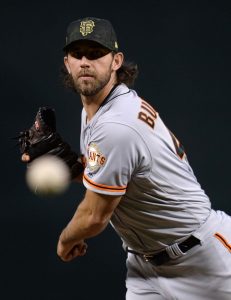July 19: The Phillies have also shown some level of interest in Blue Jays righty Marcus Stroman, tweets Jon Morosi of MLB.com. Given that Stroman is eminently available and arguably the most likely pitcher in baseball to be traded in the next two weeks, it’d be a surprise if Philadelphia (or any other team eyeing rotation upgrades) hadn’t reached out to Toronto to express interest.
July 18: It’s already been a busy day on the Phillies rumor mill, as we’ve heard reports connecting the team to such names as the Rangers’ Mike Minor, newly-minted free agent Drew Smyly, and (before he was dealt to the Red Sox) Andrew Cashner. Since pitching is such a priority for the arm-needy Phils, it’s no surprise that they’ve cast a wide eye across the pitching market, as NBC Sports Philadelphia’s Jim Salisbury reports that the Phillies have also had talks about Giants southpaw Madison Bumgarner, Tigers lefty Matt Boyd, and Diamondbacks right-hander Zack Greinke.
The Phils also looked into Homer Bailey before the Royals dealt Bailey to the Athletics last weekend, indicating that Philadelphia is looking at all ends of the pitching market. As Salisbury notes, the Phillies aren’t keen on giving up several top prospects to land a top starter, as rival teams are still putting high price tags on their best trade chips.
Lower-level targets like Cashner, Bailey, and Smyly are therefore also being explored to help stabilize at least the back of the Phillies’ rotation. Of course, the Phillies are arguably in need of multiple arms already, and that need will only become more severe if Jake Arrieta ends up requiring season-ending surgery. Trading for two top-of-the-market starters is almost surely too steep a price for the Phillies, so a tactic of acquiring just one of those top-flight arms and then signing a pitcher like Smyly could be a more viable strategy if Philadelphia does intend to pick up more than one starter.
Recent comments from team president Andy MacPhail suggest that the Phillies aren’t going to give up top prospects for a rental player (if at all), and perhaps could be more inclined to pursue trades that would see the team take on salary rather than move much in the way of notable minor league talent. This stance would seem to make it less likely that the Phillies make a strong push for Bumgarner (a free agent after the season) or Boyd, who will be relatively cost-controlled through three arbitration-eligible seasons but is only available for a team that meets the Tigers’ heavy asking price.
This leaves Greinke as a potentially very intriguing candidate, as the Diamondbacks are likelier to accept a lower-level prospect package just for the sake of getting the righty’s salary off the books. While Greinke has largely been excellent over his tenure in Arizona, his contract takes up such a big percentage of the team’s payroll that it has left the semi-rebuilding D’Backs somewhat hamstrung in terms of financial flexibility. Greinke is owed roughly $83.1MM in salary and signing bonus allotments until the end of the 2021 season — to put it in perspective, Greinke alone accounted for almost 28 percent of the Diamondbacks’ player payroll in 2019.
Trading for Greinke would probably put the Phillies over the $206MM luxury tax threshold, as Roster Resource currently projects their number as $196.36MM. The Phils could try to move some other salaries to carve out some extra payroll space, or perhaps just accept going over the tax limit as the cost of doing business for a run at the postseason.
Then again, this could all be a moot point since Greinke said in February that he didn’t want to be dealt anywhere, and the Phillies are one of the 15 teams on his no-trade list. While it’s possible Greinke’s feelings have changed in recent months, it could take some further negotiating to get Greinke into the fold, perhaps so much so that the Phillies could prefer to just move onto another trade target.
